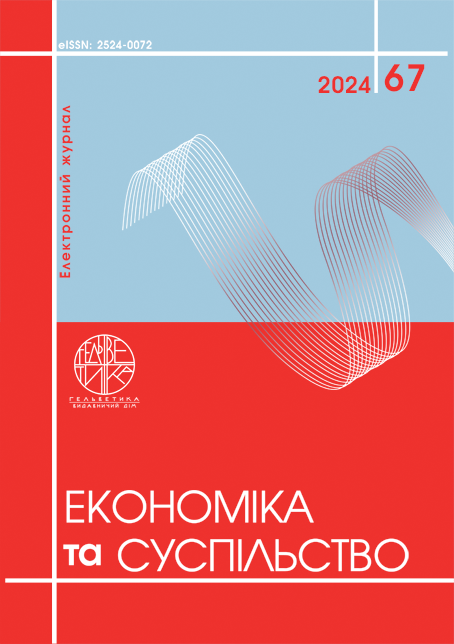РЕГІОНАЛЬНА ТУРИСТИЧНА ПОЛІТИКА В УМОВАХ КРИЗИ: ПРІОРИТЕТИ ТА НОВІ ПІДХОДИ
Анотація
Стаття аналізує вплив глобальних криз на туристичну галузь та обґрунтовує необхідність нових підходів у регіональній туристичній політиці. Увага приділяється проблемам, спричиненим пандемією COVID-19, кліматичними змінами, економічною нестабільністю та воєнними конфліктами. Підкреслюється важливість гнучкості та адаптивності туристичних стратегій, включаючи цифрову трансформацію, сталий розвиток та диверсифікацію туристичних пропозицій. Пропонуються конкретні кроки для захисту індустрії туризму від криз, зокрема розвиток інфраструктури, впровадження інновацій, посилання ролі громад та маркетингові кампанії. Підкреслюється важливість антикризового управління для швидкого відновлення регіонів.
Посилання
Графська О., Гарасимчук Н., Дудаш О. Пріоритети розвитку економіки в умовах післявоєнного відновлення: аналіз світового досвіду. Економіка та суспільство. 2024. № 64. DOI: https://doi.org/10.32782/2524-0072/2024-64-45
Baggio R., Cooper C. Knowledge transfer in a tourism destination: The effects of a network structure. The Service Industries Journal. 2010. Vol. 30(10). P. 1757–1771. DOI: https://doi.org/10.1080/02642060903580649
Becken S., Hay J. E. Tourism and climate change: Risks and opportunities. Channel View Publications, 2007. 352 p. DOI: https://doi.org/10.21832/9781845410681
Blake A., Sinclair M. T., Sugiyarto G. Quantifying the impact of foot and mouth disease on tourism and the UK economy. Tourism Economics. 2003. Vol. 9(4). P. 449–465. DOI: https://doi.org/10.5367/000000003322663221
Bramwell B., Lane B. Sustainable tourism: An evolving global approach. Journal of Sustainable Tourism. 1993. Vol. 1(1). P. 1–5. DOI: https://doi.org/10.1080/09669589309450696
Buhalis D. Marketing the competitive destination of the future. Tourism Management. 2000. Vol. 21(1). P. 97–116. DOI: https://doi.org/10.1016/S0261-5177(99)00095-3
Dredge D., Jenkins J. Tourism planning and policy. John Wiley & Sons Australia, 2007. 504 p.
Faulkner B. Towards a framework for tourism disaster management. Tourism Management. 2001. Vol. 22(2). P. 135–147. DOI: https://doi.org/10.1016/S0261-5177(00)00048-0
Gössling S., Scott D., Hall C. M. Pandemics, tourism and global change: A rapid assessment of COVID-19. Journal of Sustainable Tourism. 2021. Vol. 29(1). P. 1–20. DOI: https://doi.org/10.1080/09669582.2020.1758708
Gretzel U., Sigala M., Xiang Z., Koo C. Smart tourism: Foundations and developments. Electronic Markets. 2015. Vol. 25. P. 179–188. DOI: https://doi.org/10.1007/s12525-021-00472-y
Hall C. M. Innovation and tourism policy in Australia and New Zealand: Never the twain shall meet? Journal of Policy Research in Tourism, Leisure and Events. 2009. Vol. 1(1). P. 2–18. DOI: https://doi.org/10.1080/19407960802703466
Hall C. M., Scott D., Gössling S. Pandemics, transformations and tourism: Be careful what you wish for. Tourism Geographies. 2020. Vol. 22(3). P. 577–598. DOI: https://doi.org/10.1080/14616688.2020.1759131
Papatheodorou A., Rosselló J., Xiao H. Global economic crisis and tourism: Consequences and perspectives. Journal of Travel Research. 2010. Vol. 49(1). P. 39–45. DOI: https://doi.org/10.1177/0047287509355327
Ritchie B. W. Chaos, crises and disasters: A strategic approach to crisis management in the tourism industry. Tourism Management. 2004. Vol. 25(6). P. 669–683. DOI: https://doi.org/10.1016/j.tourman.2003.09.004
Sigala M. Tourism and COVID-19: Impacts and implications for advancing and resetting industry and research. Journal of Business Research. 2020. Vol. 117. P. 312–321. DOI: https://doi.org/10.1016/j.jbusres.2020.06.015
Hrafska, O., Harasymchuk, N., & Dudash, O. (2024). Priorytety rozvytku ekonomiky v umovakh pislyavoiennoho vidnovlennia: analiz svitovoho dosvidu [Priorities of economic development in post-war recovery: analysis of world experience]. Ekonomika ta suspilstvo, (64). DOI: https://doi.org/10.32782/2524-0072/2024-64-45 (in Ukrainian)
Baggio, R., & Cooper, C. (2010). Knowledge transfer in a tourism destination: The effects of a network structure. The Service Industries Journal, 30(10), 1757–1771. DOI: https://doi.org/10.1080/02642060903580649
Becken, S., & Hay, J. E. (2007). Tourism and climate change: Risks and opportunities. Channel View Publications. DOI: https://doi.org/10.21832/9781845410681
Blake, A., Sinclair, M. T., & Sugiyarto, G. (2003). Quantifying the impact of foot and mouth disease on tourism and the UK economy. Tourism Economics, 9(4), 449–465. DOI: https://doi.org/10.5367/000000003322663221
Bramwell, B., & Lane, B. (1993). Sustainable tourism: An evolving global approach. Journal of Sustainable Tourism, 1(1), 1–5. DOI: https://doi.org/10.1080/09669589309450696
Buhalis, D. (2000). Marketing the competitive destination of the future. Tourism Management, 21(1), 97–116. DOI: https://doi.org/10.1016/S0261-5177(99)00095-3
Dredge, D., & Jenkins, J. (2007). Tourism planning and policy. John Wiley & Sons Australia.
Faulkner, B. (2001). Towards a framework for tourism disaster management. Tourism Management, 22(2), 135–147. DOI: https://doi.org/10.1016/S0261-5177(00)00048-0
Gössling, S., Scott, D., & Hall, C. M. (2021). Pandemics, tourism and global change: A rapid assessment of COVID-19. Journal of Sustainable Tourism, 29(1), 1–20. DOI: https://doi.org/10.1080/09669582.2020.1758708
Gretzel, U., Sigala, M., Xiang, Z., & Koo, C. (2015). Smart tourism: Foundations and developments. Electronic Markets, 25, 179–188. DOI: https://doi.org/10.1007/s12525-021-00472-y
Hall, C. M. (2009). Innovation and tourism policy in Australia and New Zealand: Never the twain shall meet? Journal of Policy Research in Tourism, Leisure and Events, 1(1), 2–18. DOI: https://doi.org/10.1080/19407960802703466
Hall, C. M., Scott, D., & Gössling, S. (2020). Pandemics, transformations and tourism: Be careful what you wish for. Tourism Geographies, 22(3), 577–598. DOI: https://doi.org/10.1080/14616688.2020.1759131
Papatheodorou, A., Rosselló, J., & Xiao, H. (2010). Global economic crisis and tourism: Consequences and perspectives. Journal of Travel Research, 49(1), 39–45. DOI: https://doi.org/10.1177/0047287509355327
Ritchie, B. W. (2004). Chaos, crises and disasters: A strategic approach to crisis management in the tourism industry. Tourism Management, 25(6), 669–683. DOI: https://doi.org/10.1016/j.tourman.2003.09.004
Sigala, M. (2020). Tourism and COVID-19: Impacts and implications for advancing and resetting industry and research. Journal of Business Research, 117, 312–321. DOI: https://doi.org/10.1016/j.jbusres.2020.06.015

Ця робота ліцензується відповідно до Creative Commons Attribution 4.0 International License.


